The woman behind Friends of Eastbourne Seafront
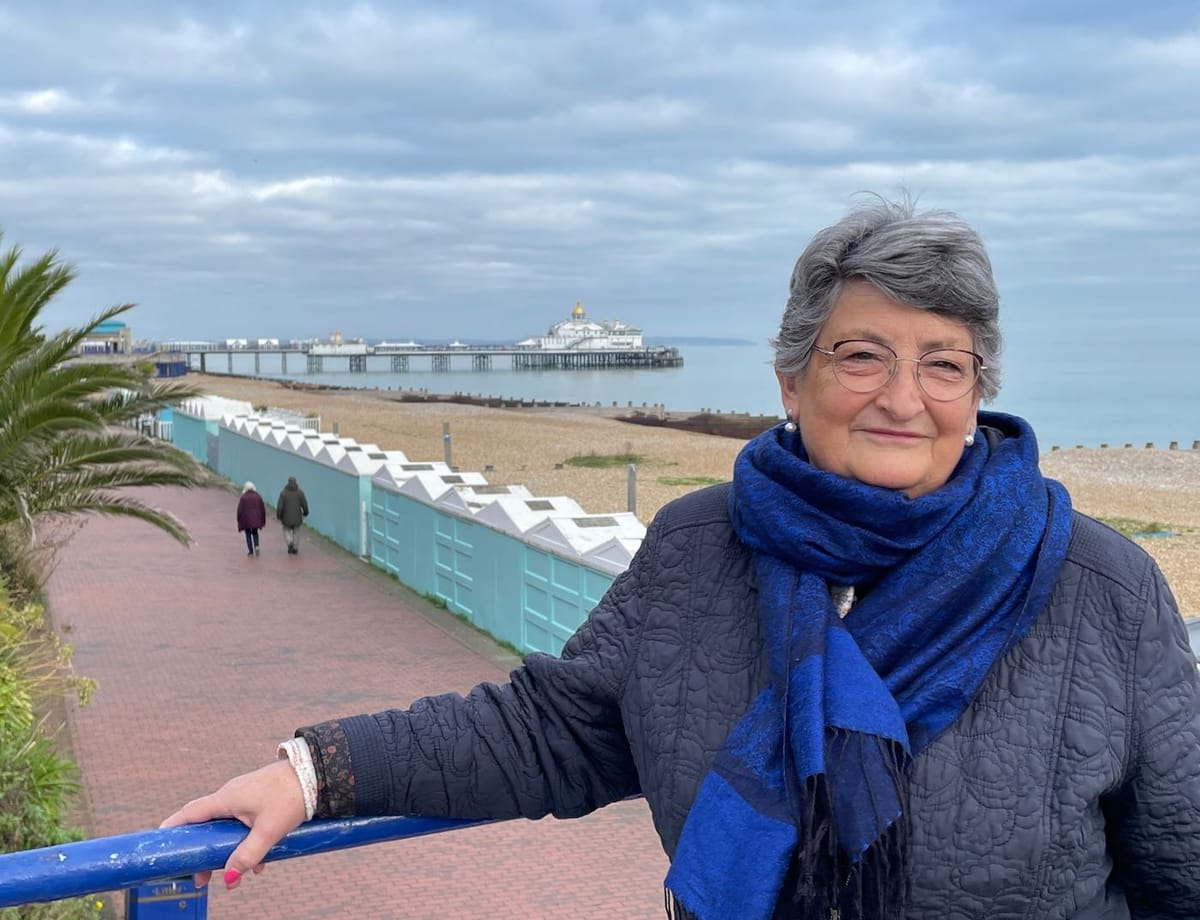
By Rebecca Maer
For a woman who has been an aid worker, forklift driver, foster carer, business owner and town mayor, Gaynor Sedgwick is modest and unassuming.
Sipping her mid-morning coffee in a seafront hotel, she could pass for a retired person enjoying her leisure time.
But Gaynor, 69, feels in some ways she’s only just getting started.
One of the founders of the Friends of Eastbourne Seafront, she is tireless in her pursuit of improvements on the four-mile promenade which draws people to the town.
They say if you want something done, ask a busy person.
And Gaynor Sedgwick is a very busy person: she runs a bed and breakfast and, in her “spare” time, co-ordinates a large team of eager volunteers who are welcoming visitors to Eastbourne, gardening and fundraising.
She is also quietly determined: “I feel we are just at the start: we have barely touched the surface,” she said.
How it started
The roots of the Friends of Eastbourne Seafront lie in a campaign to save the bandstand which started nearly three years ago.
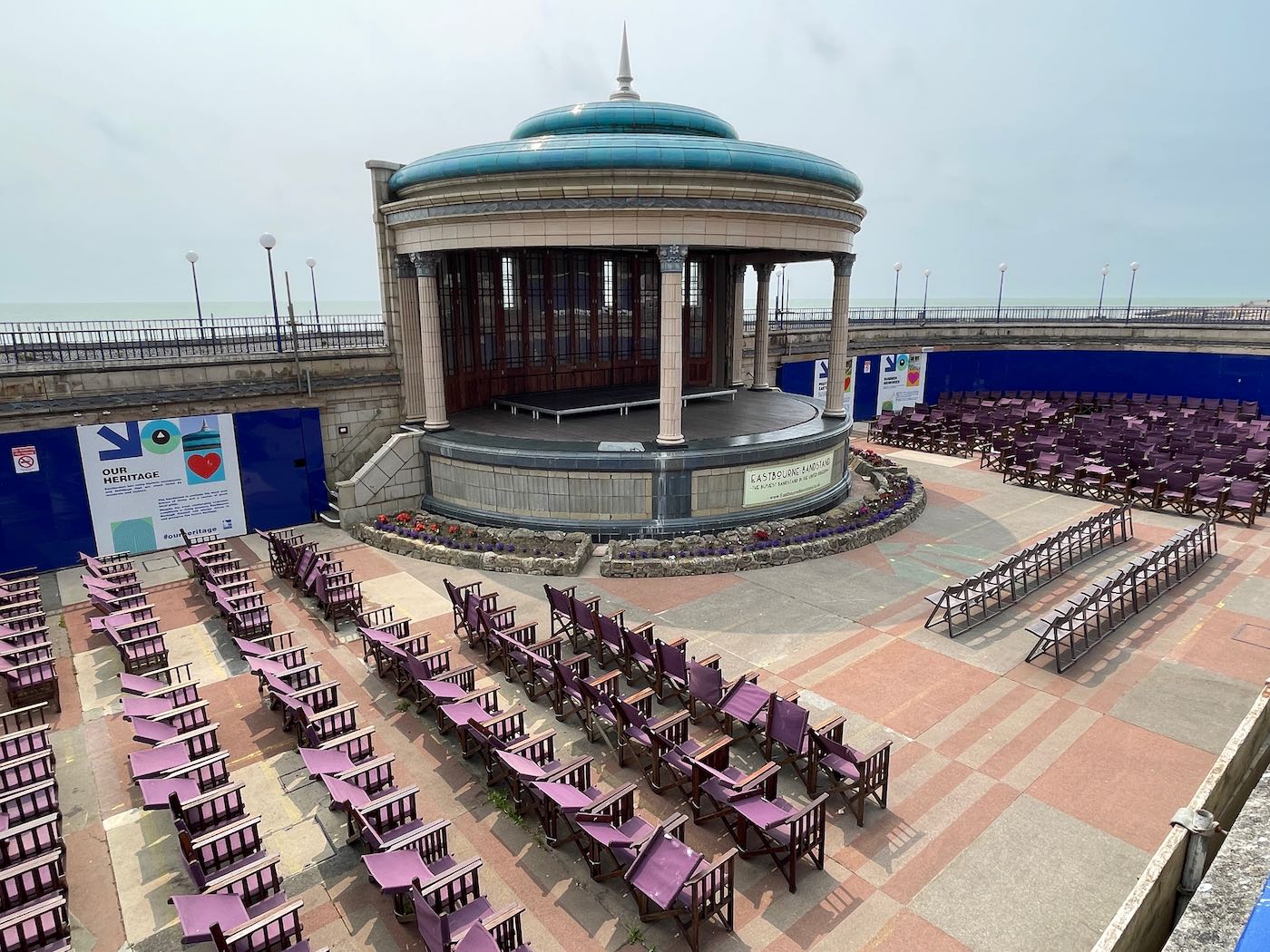
Eastbourne Borough Council had announced pre-Covid they would spend £3 million on renovating the bandstand. Post-Covid, they eventually agreed to spend £750,000 on essential repairs, saying it might take up to £8 million in total to refurbish. At the time, a petition which gathered 1,000 signatures urged the council to save the structure.
Gaynor went along to the bandstand one day when she heard the BBC were reporting on the issue. She had thought hundreds of people might be there protesting, but there were only a few.
She exchanged details with the small group and they started to go out every weekend, asking people to sign a petition about the bandstand.
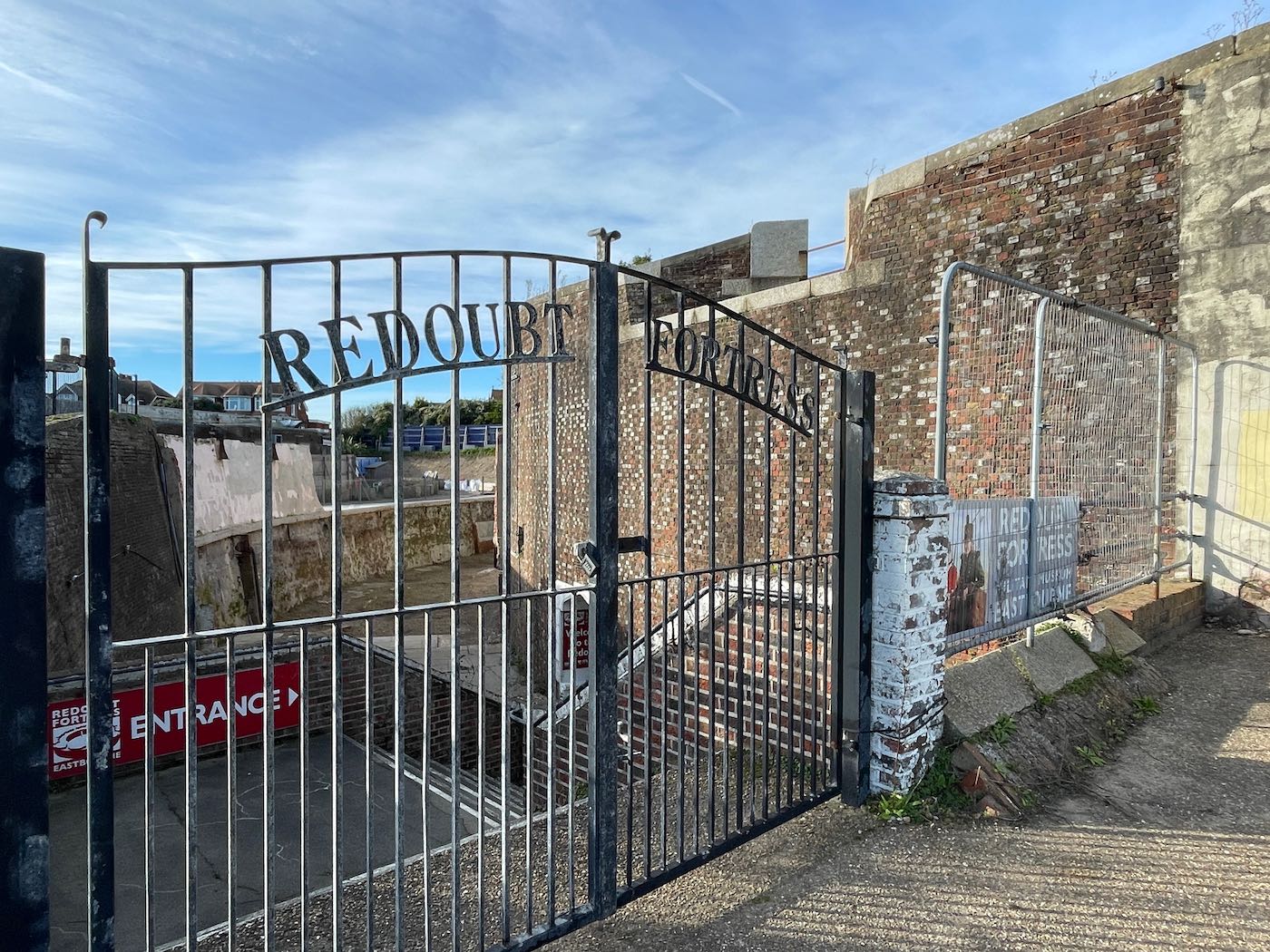
But they were also asked about what was happening to the Redoubt Napoleonic fortress (above) east of the pier and about the flower beds and other issues, so they realised concerns extended to the whole seafront.
“We just harnessed this feeling of people being unhappy at the neglect of the seafront,” she said.
The council had redeveloped the Devonshire Quarter and Welcome Centre at a cost of around £60 million immediately pre-Covid: “We wanted them to refocus their attention on the seafront,” Gaynor said.
So the group formed the Friends of Eastbourne Seafront as a not-for-profit organisation. It now has 175 paid members: £10 a year for individuals and £25 for businesses.
Who are the Friends?
Everyone involved is a volunteer, including the designer who produces booklets and maps; income covers the costs of printing, running the website and public liability insurance.
There are also branded high-visibility vests and polo shirts for volunteers.
There are dozens of volunteers. The welcome team alone has 47 people who happily chat to people on the seafront during the main season, giving them information and handing out maps and leaflets produced by the Friends.
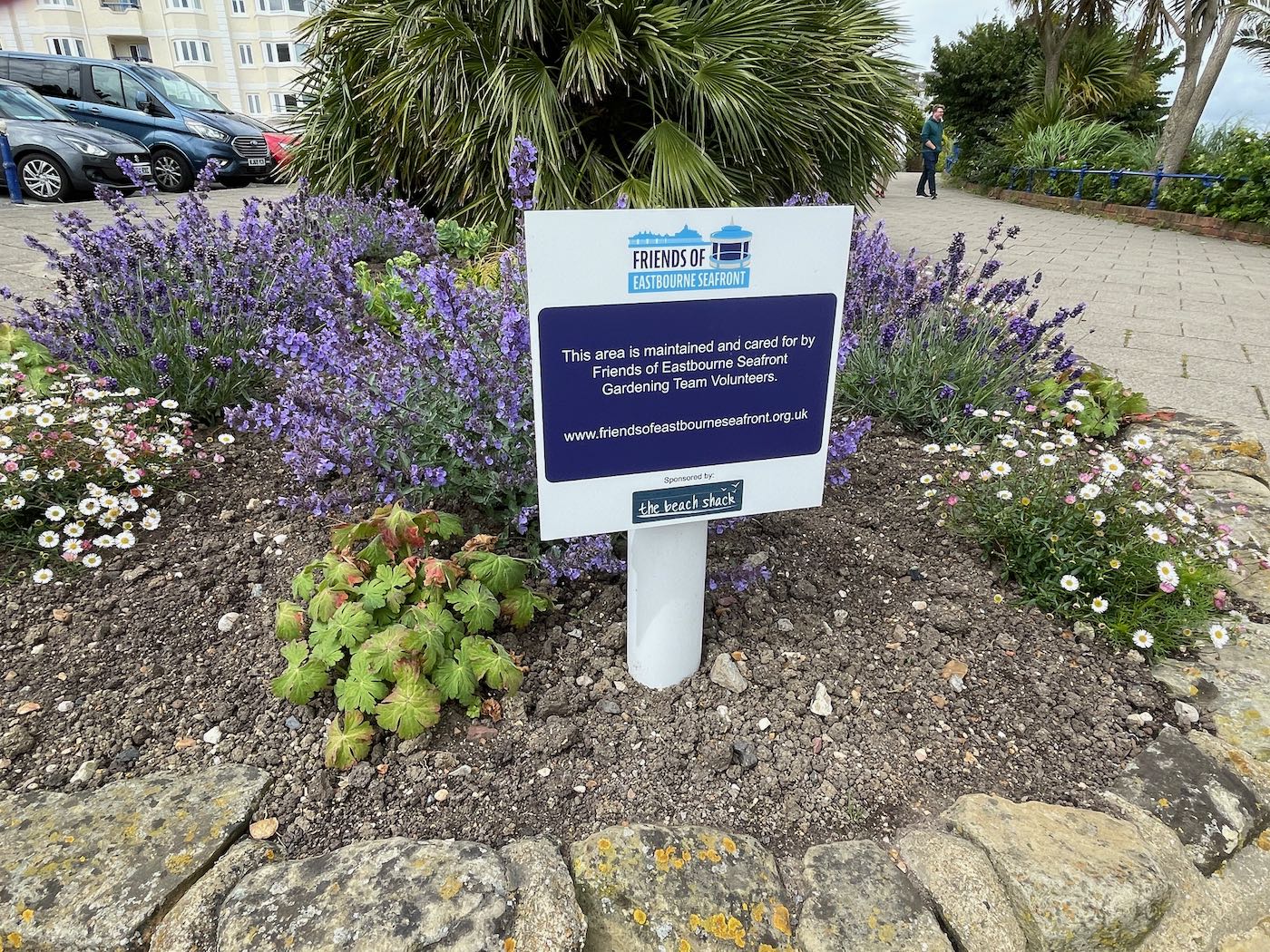
There is also a gardening team of 24 who weed and tidy neglected flowerbeds weekly, plus an events and fundraising team.
The welcome team attends pre-season familiarisation tours on the open-top sightseeing bus, hear local history talks, and visit the theatres and the Towner.
It’s a great social community: many are people who have moved to the area and wanted to make friends.
What did the Friends say about public toilets?
Gaynor spoke at the Cabinet meeting earlier this month which confirmed £3 million of cuts, including closing two of the Sovereign Centre swimming pools and finding other operators for many public toilets.
The council has said it has 19 potential locations for the Community Toilet Scheme, under which businesses allow the public to use their facilities.
Gaynor believes that the fact that the council will keep open three key seafront toilets was largely down to the Friends’ campaign and its petition of 5,200 signatures which was handed to the council.
“I believe the closures would have gone ahead but they listened to that public voice,” she said.
The British Toilet Association has been lobbying for a change in the law relating to what is statutory spending by a council and what is discretionary – something they are not compelled to do.

Currently, provision of public toilets falls under discretionary spending. Councils around the country looking at saving money are considering or have closed toilets because they are not legally required to run them.
Gaynor, and many others, believe this is wrong. “The goal is to make it a statutory obligation,” she said.
A life helping others
Gaynor brought up her three children in Newbury, Berkshire, alongside fostering children for 23 years.
She worked for a children’s aid charity in the 1990s, taking help to Albania, Croatia and Bosnia, running a warehouse and driving a forklift truck.
By her early 50s, divorced and with her children having left home, she reached a decision: she had always wanted to live by the sea and run a bed and breakfast. So she did just that. “If you don’t make something happen, it isn’t going to happen,” she said.
Gaynor moved to the small town of Seaton on the south Devon coast where the tramway tourist attraction uses trams which were in use along part of Eastbourne seafront in the 1950s and 1960s.
She ran a B&B there for ten years, was an independent town councillor, the town mayor and involved in the local chamber of commerce.
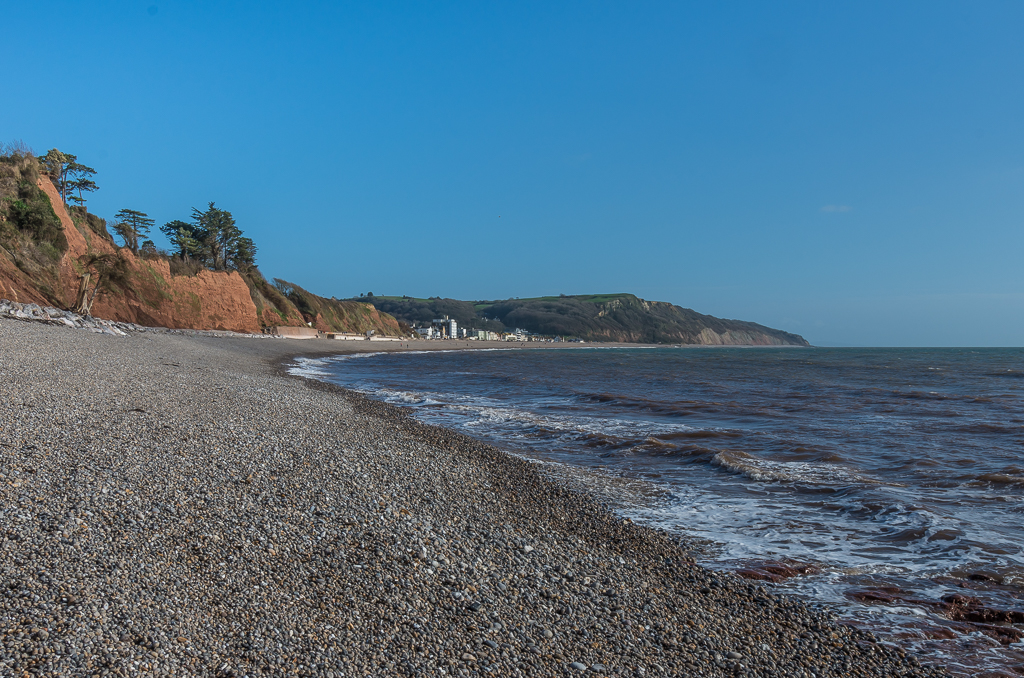
There, she also made an impact and effected change in the town by setting up a welcome team on the seafront to direct visitors.
Businesses complained that tourists coming off coaches headed straight to the supermarket, so she set up a team to point the way to independent shops instead.
“It used to lift my heart – I loved it when people used to get off the coach and turn right to the independent shops instead of left to Tesco!” she said.
Deciding she wanted a change of scene – “I wanted to move somewhere there was a bit more life, theatres and an M&S!” – she moved to Eastbourne eight years ago. She has grandchildren in Brighton.
Gaynor took over the five-bedroom bed and breakfast Number Ninety One on Royal Parade. She cooks all the breakfasts.
She said: “I thoroughly enjoy it. It’s nice meeting new people and giving them a good experience.”
When she was frequently stopped on the seafront here and asked questions by visitors, she realised a welcome team would also work in Eastbourne.
Getting stuff done
The can-do attitude of wanting to get things done can create conflict when it comes up against process-driven, risk-averse public bodies.
And so this appears to have happened with the Friends and the council.
The gardening team started when two men kept asking the council if they could do some weeding as volunteers, but were told they could not due to insurance requirements.
“The council would not agree,” said Gaynor.
"There is strength in numbers"
Regular meetings were set up with Eastbourne Borough Council leader Cllr Stephen Holt and council officers, but she felt little progress was made.
Gaynor took a characteristically pragmatic approach: “Eventually, I said: ‘We are just doing it’. They said: ‘Just give us your risk assessment’.”
The Friends now look after the cycle track near the Sovereign Centre, the bandstand, flower beds near the RNLI shop, has tidied near Bistrot Pierre and has planted up an old boat at Splash Point near the Redoubt.
Now a larger group, called Friends Together, has been formed to co-ordinate the activities of 12 different voluntary groups across the town who are litter picking and gardening.
“There is strength in numbers,” said Gaynor.
What the council says about the Friends
A statement to the Eastbourne Reporter in response to what the Friends of Eastbourne Seafront described as the lack of progress in initially allowing gardeners said: "The council values and appreciates the work of all the Friends groups – their contributions to the town are greatly valued and appreciated.
"When discussions commence with new groups, it is important to ensure that each group understands how it can work safely, for both the public and its volunteers, and that their approach aligns with the council's policies relating to biodiversity, operational service delivery and habitat improvement/management.
"These discussions are important to ensure there is a shared understanding among all stakeholders before any 'in the soil' work takes place. This is the approach adopted with the Friends of Eastbourne Seafront."
What the council says about contractor idverde
Questions remain, however, about work by contractor idverde, paid around £70,000 a month according to the council’s open data to maintain open spaces and cemeteries.
This contract runs until early 2026 but there have been multiple complaints from residents and volunteer groups that it is not sufficiently monitored.
We asked the council: what does idVerde do under this contract? How is it monitored?
The statement from the council also said: "We meet with and discuss the council's approach to grounds maintenance with a wide range of groups. These discussions are clear, from both the council's and groups' perspectives, that the work the Friends groups undertake should complement but not substitute, the work undertaken by the council's contractors.
"By working together, we can ensure that all of the council's statutory and discretionary grounds maintenance services are undertaken effectively alongside the brilliant work of the Friends' groups.
"The idverde contract delivers a wide range of activities, including digging due to underground services and using powered machinery, strimming, hedge cutting, mowing, use of chainsaws and blowers, all sitting alongside the important work of the Friends' groups.
"The council's Green Consultancy service manages and oversees the idVerde contract."
'Just keep going!'
Finally, what motivates Gaynor to carry on?
“I want to see a better seafront – I really want to see changes and improvements. If you have the energy and drive, just keep going!”
:: If you think this type of journalism, which involves interviewing and research, is better than reading PR handouts presented as ‘news’, please support me – it’s free to read but not free to produce. One-off donations are here or become a member for just the price of a coffee here.


